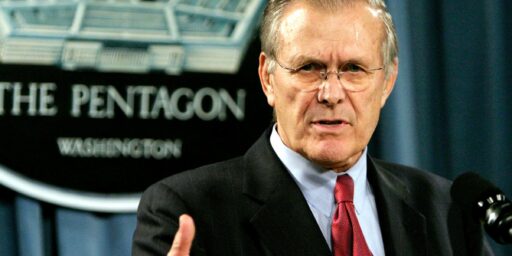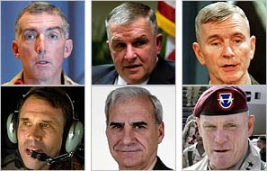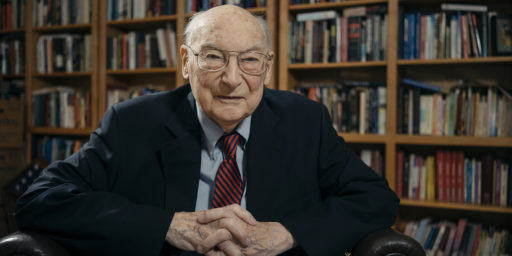Rumsfeld: U.S. Gaining World’s Respect From Wars
U.S. Gaining World’s Respect From Wars, Rumsfeld Asserts (Ann Scott Tyson, WaPo, A04)
Defense Secretary Donald H. Rumsfeld upheld the wars in Iraq and Afghanistan yesterday as powerful demonstrations of U.S. military prowess that will make other countries think twice about making “mischief” around the world.
Pressed by lawmakers on whether wear and tear on U.S. troops and equipment has impaired the Pentagon’s ability to meet unforeseen global contingencies, Rumsfeld said U.S. commanders have assured him that “our military is capable of performing.” Rumsfeld acknowledged concern about stress on the force — particularly the Army Reserve and National Guard. He said U.S. military equipment such as tanks, helicopters and Bradley Fighting Vehicles are wearing out at from two to six times the peacetime rate, leading the Pentagon to request $12 billion for equipment repairs in the fiscal 2005 emergency supplemental budget.
He also pointed to positive outcomes from the sustained combat. The fighting has created a force of “battle-hardened veterans” whose overthrow of the Taliban government in Afghanistan and Saddam Hussein’s government in Iraq erased doubts in the minds of the nation’s friends and foes over U.S. willingness to use force and stay the course of conflicts, Rumsfeld said. “The world has seen, in the last 3 1/2 years, the capability of the United States of America to go into Afghanistan . . . and with 20,000, 15,000 troops working with the Afghans do what 200,000 Soviets couldn’t do in a decade. They’ve seen the United States and the coalition forces go into Iraq. . . . That has to have a deterrent effect on people,” he testified before the House Armed Services Committee. “If you put yourself in the shoes of a country that might decide they’d like to make mischief, they have a very recent, vivid example of the fact that the United States has the ability to deal with this,” he said.
One would think that’s true. In the immortal words of Arthur Fonzarelli, before threats will be an effective deterrent, “At least once in your life you have to have actually hit someone.†By the some token, though, with our forces stretched rather thin, potential adversaries might reasonably calculate that the threshold for incurring U.S. military wrath has been raised substantially.
Rumsfeld is apparently trying to cope with this reality through his continuing military transformation efforts, which the WaPo piece touches on. WSJ and LAT cover that angle in greater detail.
Rumsfeld Details Big Military Shift In New Document (Greg Jaffe, WSJ p.1 $)
Defense Secretary Donald Rumsfeld outlines in a new, classified planning document a vision for remaking the military to be far more engaged in heading off threats prior to hostilities and serve a larger purpose of enhancing U.S. influence around the world. The document sets out Mr. Rumsfeld’s agenda for a recently begun massive review of defense spending and strategy. Because the process is conducted only once every four years, the review represents the Bush administration’s best chance to refashion the military into a force capable of delivering on the ambitious security and foreign-policy goals that President Bush has put forth since the terrorist attacks of Sept. 11, 2001. It is being conducted by senior members of Mr. Rumsfeld’s staff along with senior officers from each of the armed services.
Mr. Rumsfeld’s goals, laid out in the document, mark a significant departure from recent reviews. Deeply informed by both the terrorist attacks of Sept. 11, 2001, and by the military’s bloody struggle in Iraq, the document emphasizes newer problems, such as battling terrorists and insurgents, over conventional military challenges.
Mr. Rumsfeld’s approach likely will trigger major shifts in the weapons systems that the Pentagon buys, and even more fundamental changes in the training and deployment of U.S. troops throughout the world, said defense officials who have played a role in crafting the document or are involved in the review.
In the document, Mr. Rumsfeld tells the military to focus on four “core problems,” none of them involving traditional military confrontations. The services are told to develop forces that can: build partnerships with failing states to defeat internal terrorist threats; defend the homeland, including offensive strikes against terrorist groups planning attacks; influence the choices of countries at a strategic crossroads, such as China and Russia; and prevent the acquisition of weapons of mass destruction by hostile states and terrorist groups. “The question we are asking is: How do you prevent problems from becoming crises and crises from becoming all-out conflicts?” said one senior defense official involved in writing the guidance.
At its heart, the document is driven by the belief that the U.S. is engaged in a continuous global struggle that extends far beyond specific battlegrounds, such as Iraq and Afghanistan. The vision is for a military that is far more proactive, focused on changing the world instead of just responding to conflicts such as a North Korean attack on South Korea, and assuming greater prominence in countries in which the U.S. isn’t at war.
Not surprisingly, the LAT’s take is more negative.
Iraq War Compels Pentagon To Rethink Big-Picture Strategy (Mark Mazzetti, LAT, p.1)
The war in Iraq is forcing top Pentagon planners to rethink several key assumptions about the use of military power and has called into question the vision set out nearly four years ago that the armed forces can win wars and keep the peace with small numbers of fast-moving, lightly armed troops. As the Pentagon begins a comprehensive review that will map the future of America’s armed forces, many Defense Department officials are acknowledging that an intractable Iraqi insurgency they didn’t foresee has undermined the military strategy.
In the weeks after the Sept. 11 attacks, the Pentagon unveiled a new agenda that promised to prepare the military to fight smaller wars against terrorist networks and to swiftly defeat rogue states. With Defense Secretary Donald H. Rumsfeld pushing for a “lighter, more lethal and highly mobile fighting force,” the Pentagon scrapped as outdated the requirement that the U.S. military be large enough to simultaneously fight two large-scale wars against massed enemy armies. And it spent little time worrying about how to keep the peace after the shooting stopped.
Something happened on the way to the wars of the future: The Pentagon became bogged down in an old-fashioned, costly and drawn-out war of occupation. Though the rapid assault on Baghdad in March 2003 went smoothly, it is the bloody two years since that have diverged from the Pentagon’s blueprint. “When people were thinking about regime change, they really weren’t thinking about the long-term stabilization and peacekeeping operations. There was a view that in terms of gross numbers, [regime change operations] wouldn’t last as long as Iraq has,” said Rand Corp. fellow Andrew Hoehn, who led the Pentagon’s last major review in 2001.
Both takes are correct. There’s no denying that most advocates for the war, including its planners, woefully underestimated the size of the insurgency. The military brass has resisted, for good reason, being reshaped into a peacekeeping-centric force. Unfortunately, it’s become clear over the last decade plus that traditional warfighting will occupy far less of the military’s time than peace and stabilization operations. Our conventional capability is so strong that we’ll quickly defeat any likely foe. What’s lacking is the ability to commit large numbers of appropriately trained forces for a sustained period to do the unpleasant but necessary work that comes after military victory.





In the immortal words of Arthur Fonzarelli, before threats will be an effective deterrent, “At least once in your life you have to have actually hit someone.â€Â
Or, “You can’t call yourself a gunslinger if you’ve never slung a gun.”
Yea, because – you know – the US had never hit anyone before Iraq v2. Everyone thought we were wimps up until then.
Right — the Carter-era helicopter debacle in the Iranian desert, and the Clinton-era debacle in Mogadishu, those proved just how rough and tough the good old U.S. of A. really is.
Hal, why aren’t you still trolling Protein Wisdom?
In all fairness you should include Reagan’s pull out of Lebanon after the barracks bombing, though the whiny Dems in Congress had a major role in forcing that humiliating withdrawal.